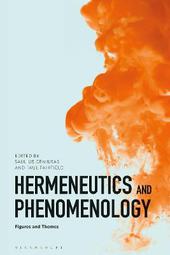
|
Hermeneutics and Phenomenology: Figures and Themes
Hardback
Main Details
| Title |
Hermeneutics and Phenomenology: Figures and Themes
|
| Authors and Contributors |
Edited by Saulius Geniusas
|
|
Edited by Professor Paul Fairfield
|
| Physical Properties |
| Format:Hardback | | Pages:248 | | Dimensions(mm): Height 234,Width 156 |
|
| Category/Genre | Phenomenology and Existentialism
Philosophy - metaphysics and ontology |
|---|
| ISBN/Barcode |
9781350078024
|
| Classifications | Dewey:121.686 |
|---|
| Audience | | Tertiary Education (US: College) | |
|---|
|
Publishing Details |
| Publisher |
Bloomsbury Publishing PLC
|
| Imprint |
Bloomsbury Academic
|
| Publication Date |
20 September 2018 |
| Publication Country |
United Kingdom
|
Description
The relationship between these two central theoretical and philosophical approaches, which we thought we knew, is more complex and interesting than our standard story might suggest. It is not always clear how hermeneutics-that is, post-Heideggerian hermeneutics as articulated by Hans-Georg Gadamer, Paul Ricoeur, and a large number of thinkers working under their influence-regards the phenomenological tradition, be it in its Husserlian or various post-Husserlian formulations. This volume inquires into this issue both in general, conceptual terms and through specific analyses into questions of ontology and metaphysics, science, language, theology, and imagination. With a substantial editors' introduction, the volume contains 15 chapters, from some of the most significant scholars in this field covering the essential questions about the history, present and future of these two disciplines. The volume will be of interest to any philosopher or student with an interest in developing a sophisticated and nuanced understanding of contemporary hermeneutics and phenomenology.
Author Biography
Saulius Geniusas is Associate Professor of Philosophy at the Chinese University of Hong Kong. He is the author or editor of several books and anthologies, including The Origins of the Horizon in Husserl's Phenomenology (2012), Stretching the Limits of Productive Imagination (2018). Paul Fairfield is Professor of Philosophy at Queen's University in Kingston, ON, Canada. He is the author of nine sole-authored books and editor or co-editor of five anthologies. His writings cover themes in philosophical hermeneutics, phenomenology, and pragmatism.
ReviewsGeniusas and Fairfield have assembled an exceptional collection that frames a key problem about the relation between hermeneutics and phenomenology, and reopens this topic on multiple fronts. Indeed, I have the highest praise for this volume. Its contribution could, perhaps, never have been more timely than today. * Notre Dame Philosophical Reviews * Although central to the development of twentieth century European thought, the relation between hermeneutics and phenomenology has been surprisingly little addressed. Under the direction of Fairfield and Geniusas, the contributors to this volume do an important service in opening up the issues at stake here. Combining historical reflection with contemporary analysis, offering a broad range of topics and approaches, and including essays by many of the key figures across both fields, the volume offers a rich source of material for students and researchers alike. * Jeff Malpas, Distinguished Professor, University of Tasmania, Australia * This extended comparison of hermeneutics and phenomenology lets the reader see afresh what is specific to each current, and how they have interacted and pulled apart. The editors have assembled thorough treatments of the most famous advocates of both schools, but also with generous treatments of less prominent philosophers from the 19th to the 21st Century. In carrying this project out, the book treats the central questions of philosophy: historical thinking vs. systematic reason; realism vs. idealism; the hermeneutical circle and the scientific method; the relation of philosophy to art, literature and religion. The excellent articles, by over a dozen authors, are accurate in exposition and documentation. * Graeme Nicholson, Emeritus Professor of Philosophy, University of Toronto, Canada *
|